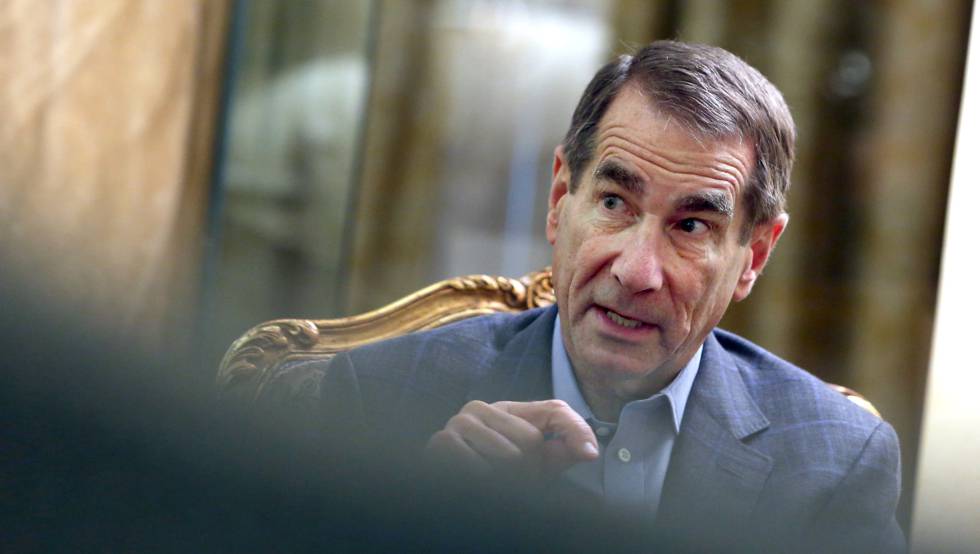Alan Solomont: “It is scandalous for Trump to be defending Putin”
Former US ambassador to Spain warns of Russian interference in western democracies
Madrid
It has been four years since Alan Solomont, from Boston, Massachusetts, left Spain after serving as United States ambassador, but his links with the country continue to be numerous and diverse. “First for the friends that [his wife] Susan and I left behind,” he says without hesitation. Then for business: he is a board member of insurer Mapfre USA and the US subsidiary of power utility Iberdrola, among others. He also has institutional ties, as president of the United States-Spain Chamber of Commerce, the position that brought him to Madrid this week.

Alan Solomont, former US ambassador to Spain, pictured in Madrid. JAIME VILLANUEVA EL PAÍS
Question. How has the situation in Spain changed in these last three years?
Answer. It has changed even since I was last here! Now we only talk about Catalonia and my friends in the US are very concerned about security and regret that it is an issue that causes so much division because it is the only thing they read about Spain.
Q. Do you think that the Catalan issue is harming Spain’s external image?
I am alarmed by Russia’s interference in our democracies
A. I am afraid so, the image has been damaged and the economy as well. There has been a clear decline in tourism in Catalonia and I know of projects that have been put on hold to see what happens.
Q. What can you tell us about Russian interference in Catalonia?
A. I do not have specific information on the Catalan issue, but I am alarmed by Russia’s interference in our democracies, which were threatened in the United States and perhaps also in Catalonia. Cybersecurity is one of the great issues of the 21st century, one that we have barely started to tackle. Before we worried about the possibility of a power outage or that the water supply was contaminated. We weren’t worried about the possibility of interference through public opinion. Now we just went through that and it is shocking.
Q. What kind of response does this new threat require?
A. I think we should take this issue a lot more seriously, starting with our government, and invest in the tools and means to combat it. What the Russians did in the 2016 presidential election undoubtedly affected the outcome and all of us who believe in democracy, inside and outside the United States, should be concerned. We have to invest in intellectual, financial and military resources to combat this threat. Otherwise, all the work we have done to build and guarantee our democracies will be useless.
Q. It does not seem like your government, specifically President Trump, share that concern.
A. It is scandalous for the president to criticize US intelligence agencies and defend Vladimir Putin. Absolutely scandalous. That being said, the result of the elections is what it is and must be respected. And with respect, you can fight that result at the polls.
Q. Do you think that the wins by the Democrats in several states indicates the beginning of a political change in the US?
When I was in Spain, the principle that guided our foreign policy was that challenges were too great for only the US to solve them on its own
A. I think part of the success is a consequence of citizens’ rejection of Trump’s policies but I believe that the future of the Democratic Party depends on establishing solid links with young people. In the United States, politicians do not target young people, because they usually do not have a high turnout in elections. And yet, they represent the largest pool of possible voters and are the largest generation in the country, so they have a real capacity to change the political landscape.
Q. Are we witnessing the end of the United States’ role as a global leader?
A. When I was in Spain as the representative for President Barack Obama [2009-2013], the principle that guided our foreign policy was that the challenges were too great for only the United States to solve them on its own, but that none could be resolved without the US. Now there has been a radical change in that vision and I think it is very harmful for the United States and for the rest of the world. One of the best examples is the abandonment of the Trans-Pacific Partnership Agreement by this administration. It was not just about trade, but about geopolitics and setting new standards in international relations. Hopefully we can change that course before the damage is irreparable.
English version by Debora Almeida.






































No hay comentarios:
Publicar un comentario